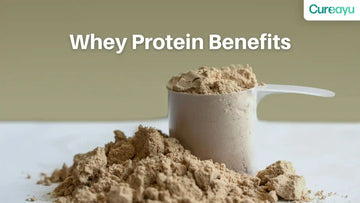Whey protein has become a buzzword in the health and fitness industry, widely recognized for its remarkable ability to aid muscle growth, boost recovery, and support overall health. Whether you're an athlete, a fitness enthusiast, or someone seeking better nutrition, whey protein offers unparalleled benefits. But what exactly is whey protein, and why is it so popular?
Derived from milk, whey protein is a complete protein packed with essential amino acids that are crucial for building and repairing muscles. It’s not just for gym-goers; its versatility makes it a great addition to anyone's diet, helping with weight management, immunity, and even skin health. In this blog, we’ll explore the origins of whey protein, its benefits, and how to incorporate it into your routine for optimal results.
Also Read: Can We Build Muscle Without Protein? Understanding The Role of Protein in Muscle Building
What Is Whey Protein?
Whey protein is a byproduct of the cheese-making process, derived from the liquid that separates from milk when it is curdled. This liquid is filtered, purified, and processed into powder form, which is commonly used in supplements. Whey protein is categorized into three main types:
- Whey Protein Concentrate (WPC): Contains low levels of fat and carbohydrates, with protein concentration ranging from 30-80%.
- Whey Protein Isolate (WPI): Highly purified, with up to 90% protein content, and minimal fat or lactose.
- Whey Protein Hydrolysate (WPH): Pre-digested for faster absorption, often used in medical protein supplements.
This fast-digesting protein source is rich in branched-chain amino acids (BCAAs) like leucine, which plays a critical role in muscle repair and growth.
Is Whey Protein Good For Health?
Whey protein is not only good for health but also one of the most effective and versatile protein sources available. Its high biological value means the body absorbs and utilizes it efficiently. Rich in essential nutrients, whey protein supports muscle repair, enhances metabolism, and contributes to overall health.
Moreover, whey protein is a boon for people with specific dietary needs. It provides a concentrated source of protein without the added fats and carbohydrates found in whole foods, making it ideal for weight management. Additionally, its antioxidant properties strengthen immunity by boosting glutathione levels, the body's primary defense molecule.
Also Read: Exploring the Protein Benefits: Why Protein Is Essential for Your Body and Overall Health
Whey Protein Powder Benefits
1. Supports Muscle GrowthWhey protein is a complete protein source packed with branched-chain amino acids (BCAAs), particularly leucine, which plays a critical role in activating muscle protein synthesis. This process helps build and repair muscle tissues, making whey protein a top choice for bodybuilders, athletes, and fitness enthusiasts. Its fast absorption rate ensures that muscles receive nutrients quickly after exercise, optimizing growth and recovery.
2. Aids in Weight Loss
Whey protein is highly effective for weight management. Its high protein content increases satiety, reducing hunger pangs and preventing overeating. By promoting a feeling of fullness, it aids in calorie control, which is crucial for weight loss. Additionally, whey protein enhances metabolism through the thermic effect of food (TEF), which helps the body burn more calories during digestion. Combined with regular exercise, it promotes fat loss while preserving lean muscle mass.
3. Enhances Recovery
Intense physical activities can cause micro-tears in muscle fibers, leading to soreness and fatigue. Whey protein accelerates the recovery process by delivering essential amino acids to the muscles. These nutrients help repair damaged tissues, reduce inflammation, and alleviate post-workout soreness, enabling you to recover faster and perform better in subsequent training sessions.
4. Improves Athletic Performance
Whey protein supports endurance and strength, making it an invaluable supplement for athletes. It replenishes the body’s protein stores, which are often depleted during rigorous training. Regular consumption can improve stamina, muscle power, and overall physical performance by supporting energy production and minimizing fatigue.
5. Manages Blood Sugar Levels
Whey protein has a low glycemic index and positively impacts blood sugar control. It slows down the absorption of glucose in the bloodstream, preventing spikes and crashes in blood sugar levels. Additionally, whey protein stimulates insulin production, which helps regulate glucose levels effectively. This makes it an excellent dietary addition for individuals with diabetes or those seeking better glycemic control.
6. Boosts Immunity
Rich in bioactive compounds like lactoferrin, immunoglobulins, and glutathione precursors, whey protein strengthens the immune system. These compounds help the body fight off infections and improve overall immunity. By boosting antioxidant levels, whey protein also protects cells from oxidative stress, enhancing the body’s ability to ward off illnesses.
7. Improves Skin Health
Whey protein is a powerhouse of amino acids that promote collagen production, which is essential for skin elasticity and repair. Its antioxidant properties help combat free radicals, reducing signs of aging like wrinkles and fine lines. Regular consumption can detoxify the skin, prevent acne, and promote a radiant complexion, making it beneficial for those seeking healthier skin.
8. Strengthens Bones
Whey protein contains high levels of calcium and other essential amino acids that are crucial for bone health. It supports bone density, reducing the risk of conditions like osteoporosis. By aiding in the absorption of calcium and other minerals, whey protein helps maintain strong and healthy bones, especially in aging individuals.
9. Promotes Heart Health
Studies suggest that whey protein contributes to better cardiovascular health by lowering bad cholesterol (LDL) and reducing blood pressure. Its anti-inflammatory properties improve blood vessel function, reducing the risk of atherosclerosis and heart-related diseases. Including whey protein in your diet can support a healthy heart and improve overall circulation.
10. Supports Digestive Health
Whey protein isolate, which is low in lactose, is easier to digest and suitable for individuals with mild lactose intolerance. It contains bioactive peptides that support gut health by promoting beneficial bacteria and reducing inflammation. By aiding in nutrient absorption and preventing digestive discomfort, whey protein contributes to a healthier digestive system.
Also Read: High Protein Foods for Weight Gain: Eating for Gains with These 8 Protein Powerhouses
Whey Protein Results
- Visible Muscle Definition: Regular intake, coupled with resistance training, results in toned and defined muscles.
- Faster Recovery Time: Athletes experience reduced muscle soreness and quicker recovery post-training.
- Improved Strength Levels: Consistent use enhances strength, enabling better performance in physical activities.
- Fat Loss and Lean Muscle Gain: Whey protein supports fat loss while preserving lean muscle mass.
- Better Metabolic Rate: It increases energy expenditure, supporting weight management goals.
Is Whey Protein Safe?
Whey protein is generally safe for most people when consumed within recommended doses. However, individuals with lactose intolerance should opt for whey protein isolate or hydrolysate, as they contain minimal lactose. Over Consumption may lead to side effects like digestive discomfort, bloating, or kidney strain in rare cases.
It’s essential to consult a healthcare professional or nutritionist to determine the right dosage based on your specific needs, especially if you have pre-existing medical conditions.
Also Read: Discover 15 High Protein Foods That Can Boost Your Health and Fitness
Conclusion
Whey protein stands out as a powerhouse supplement, offering a host of benefits for fitness enthusiasts and anyone striving for better health. From supporting muscle growth and weight loss to boosting immunity and enhancing skin health, its versatility is unmatched.
Incorporating whey protein into your diet is simple and effective, whether through shakes, smoothies, or baked goods. While it’s a fantastic addition to a healthy lifestyle, moderation is key. Pair it with a balanced diet and regular exercise to unlock its full potential. Choose whey protein wisely, and let it help you achieve your fitness and health goals with ease!








